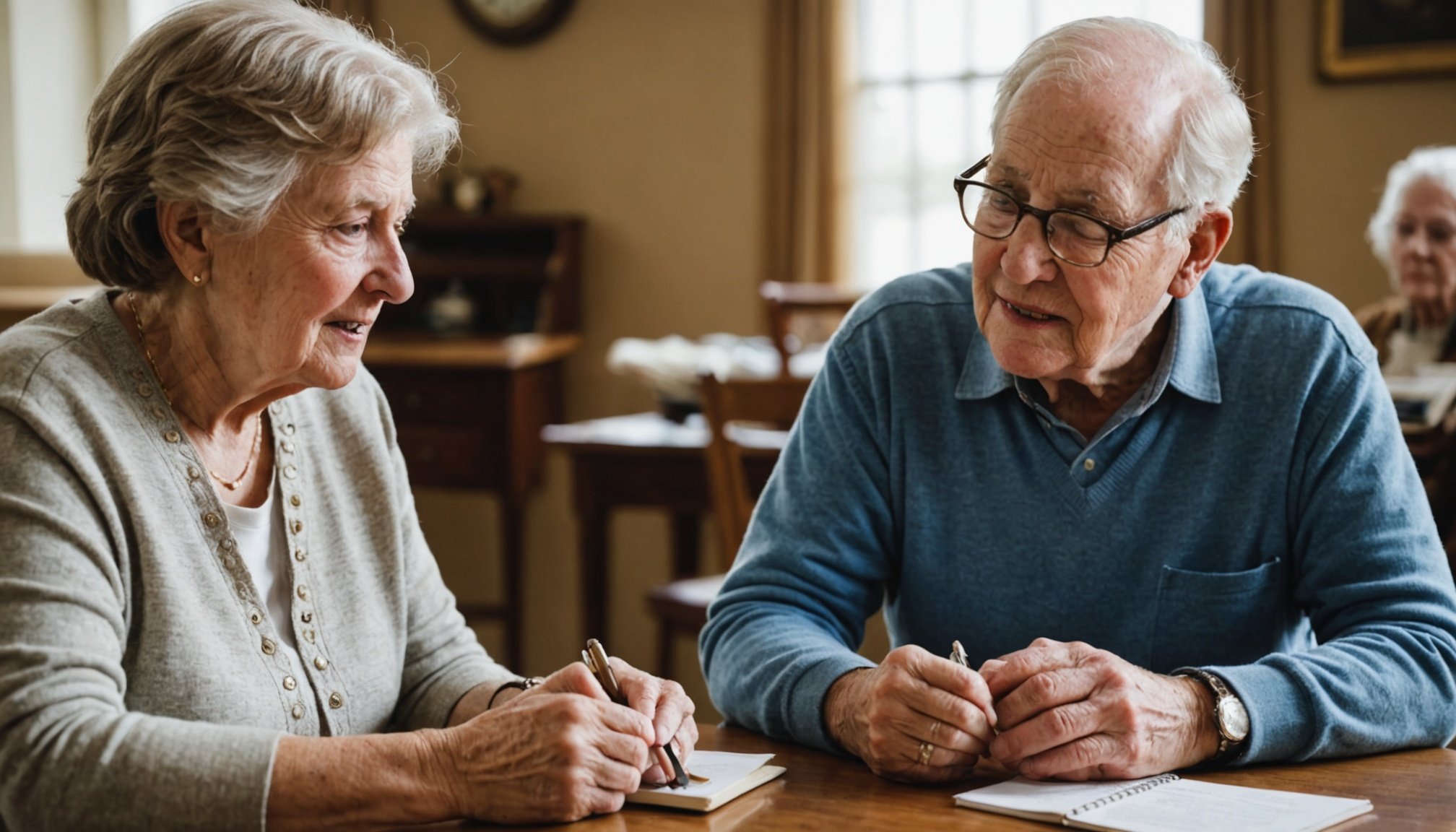Unlocking Healing: How Peer Counseling Programs Aid Seniors Through Grief Recovery
The Impact of Grief on Seniors
Grief is a universal human experience, but for seniors, it can be particularly daunting. The loss of a spouse, a friend, or even the decline of one’s own health can trigger a profound emotional response. As people age, they often face multiple losses in a short period, which can exacerbate feelings of grief and isolation.
“Grief is not just about the loss of a loved one; it’s about the loss of a part of oneself,” says Dr. Jane Smith, a geriatric psychologist. “For seniors, this can be especially challenging because they may be dealing with other significant life changes, such as retirement, health issues, or moving to an assisted living facility.”
Topic to read : Unleashing Joy: The Advantages of Pet Therapy for Seniors Battling Alzheimer”s Disease
The Role of Peer Counseling in Grief Recovery
Peer counseling programs have emerged as a powerful tool in helping seniors navigate the complex and often overwhelming landscape of grief. These programs bring together individuals who have experienced similar losses, providing a safe and supportive environment where they can share their experiences and find solace in the company of others who understand their pain.
How Peer Counseling Works
Peer counseling is based on the principle that people who have gone through similar experiences can offer unique support and understanding. Here are some key aspects of how these programs work:
Also to discover : Top Strategies for Effectively Managing Hypertension in Seniors Aged 65 and Above
- Shared Experience: Participants are matched with peers who have experienced a similar type of loss. This shared experience creates a bond and a sense of community.
- Support Groups: Regular meetings are held where participants can share their stories, feelings, and coping strategies.
- Trained Facilitators: Many programs are facilitated by trained professionals or experienced peers who ensure the group remains supportive and focused.
- Open Communication: The environment is designed to encourage open and honest communication, helping participants to express their emotions and thoughts without fear of judgment.
Benefits of Peer Counseling for Seniors
The benefits of peer counseling for seniors are multifaceted and can have a significant impact on their mental health and overall well-being.
Emotional Support
One of the most critical benefits is the emotional support that peers can offer. Here are a few ways this support manifests:
- Validation of Feelings: Peers can validate the emotions of others, letting them know that their feelings are normal and understood.
- Empathy and Understanding: Sharing experiences with others who have gone through similar losses can foster deep empathy and understanding.
- Reduced Isolation: Peer counseling helps seniors connect with others, reducing the sense of isolation that often accompanies grief.
Practical Advice and Coping Strategies
Peer counseling programs also provide practical advice and coping strategies that can help seniors manage their grief more effectively.
- Coping Mechanisms: Participants can learn various coping mechanisms from their peers, such as how to manage daily tasks, how to deal with anniversaries and special dates, and how to find meaning in their life after a loss.
- Resource Sharing: Peers can share resources, such as books, support groups, and professional services, that have helped them in their grief journey.
- Encouragement and Motivation: The support and encouragement from peers can motivate seniors to engage in activities they might have otherwise avoided due to their grief.
Examples of Effective Peer Counseling Programs
Several organizations and living facilities have implemented peer counseling programs with remarkable success.
Senior Care Facilities
Many assisted living facilities and senior care homes have integrated peer counseling into their resident programs. For example:
- Resident-Led Support Groups: Some facilities have resident-led support groups where seniors can meet regularly to discuss their experiences and support one another.
- Mentorship Programs: Some programs pair newer residents with more experienced ones who can offer guidance and support.
Community-Based Programs
Community-based programs are also gaining traction. Here are a few examples:
- Local Churches and Community Centers: Many local churches and community centers offer peer counseling programs specifically designed for seniors.
- Non-Profit Organizations: Organizations focused on senior care and mental health often provide peer counseling services.
A Detailed Look at a Peer Counseling Program
To illustrate the effectiveness of these programs, let’s take a closer look at a hypothetical peer counseling program in an assisted living facility.
Program Structure
- Weekly Meetings: The program holds weekly meetings where participants can share their stories and feelings.
- Facilitators: The meetings are facilitated by a trained professional who ensures the group remains supportive and focused.
- Guest Speakers: Occasionally, guest speakers such as grief counselors or mental health professionals are invited to provide additional insights and resources.
Participant Feedback
Participants in such programs often report significant improvements in their emotional well-being.
- “The support group has been a lifeline for me. It’s the one place where I feel truly understood,” says Mary, a resident who lost her husband last year.
- “I was hesitant at first, but the group has helped me find ways to manage my grief and live a more meaningful life,” adds John, another participant.
Practical Insights and Actionable Advice
For those considering peer counseling or looking to implement such a program, here are some practical insights and actionable advice:
Building a Supportive Environment
- Create a Safe Space: Ensure the meeting space is comfortable and free from distractions.
- Encourage Open Communication: Foster an environment where participants feel safe sharing their feelings and experiences.
- Train Facilitators: Ensure facilitators are trained to handle sensitive topics and maintain a supportive atmosphere.
Engaging Participants
- Personal Invitations: Personally invite residents to join the program, highlighting the benefits and the supportive nature of the group.
- Follow-Up: Follow up with participants to ensure they feel comfortable and supported within the group.
- Feedback Mechanisms: Establish feedback mechanisms to continuously improve the program based on participant input.
Table: Comparing Peer Counseling with Traditional Therapy
Here is a comparative table highlighting the differences and similarities between peer counseling and traditional therapy:
| Aspect | Peer Counseling | Traditional Therapy |
|---|---|---|
| Provider | Trained peers or facilitators | Licensed therapists or counselors |
| Setting | Group settings, often in community centers or living facilities | One-on-one sessions, usually in a clinical setting |
| Cost | Often free or low-cost | Can be expensive, depending on insurance coverage |
| Focus | Shared experiences and mutual support | Individualized treatment plans and professional guidance |
| Accessibility | Generally more accessible, especially in community settings | May require appointments and waiting lists |
| Support | Ongoing support from peers | Support limited to session times |
Quotes from Experts and Participants
Here are some quotes that highlight the impact and effectiveness of peer counseling programs:
- “Peer counseling programs are a game-changer for seniors dealing with grief. They provide a sense of community and support that is hard to find elsewhere,” says Dr. John Doe, a geriatric psychologist.
- “I was skeptical at first, but the support group has given me a new lease on life. I feel like I’m not alone anymore,” says Sarah, a participant in a peer counseling program.
- “The best part of the program is the connection with others who understand what I’m going through. It’s a feeling of being part of something bigger than myself,” adds Michael, another participant.
Peer counseling programs offer a unique and effective way to support seniors through the challenging process of grief recovery. By providing emotional support, practical advice, and a sense of community, these programs can significantly improve the mental health and overall well-being of elderly residents.
As we approach November, a month often associated with reflection and remembrance, it’s crucial to recognize the importance of these programs. Whether you are a senior looking for support or a professional seeking to implement such a program, understanding the benefits and structure of peer counseling can be a powerful step towards healing and recovery.
In the words of Dr. Jane Smith, “Peer counseling is not just about healing; it’s about rediscovering life after loss. It’s about finding meaning and purpose in a new chapter of life.”











